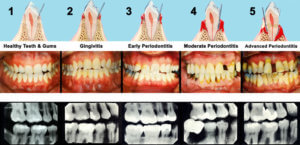Gum Disease Therapy
Do you have gum disease?

Gum Disease has been linked to:
- An increased risk of heart attack or stroke,
- An increased risk of delivering preterm, low birth weight babies,
- Difficulty controlling blood sugar levels in people with diabetes
How do I know if I have periodontal disease?

Symptoms are often not noticeable until the disease is advanced. They include:
- Bad breath that won’t go away
- Red or swollen gums
- Tender or bleeding gums
- Painful chewing
- Loose teeth
- Sensitive teeth
What causes periodontal disease?
Our mouths are full of bacteria. These bacteria, along with mucus and other particles, constantly form a sticky, colorless “plaque” on teeth. The longer plaque and tartar are on teeth, the more harmful they become. The bacteria cause inflammation of the gums that is called “gingivitis.”
In gingivitis, the gums become red, swollen and can bleed easily. Gingivitis is a mild, reversible form of gum disease. When gingivitis is not treated, it can advance to “periodontitis” which means “inflammation around the tooth”. In periodontitis, gums pull away from the teeth and form “pockets” that are infected. If not treated, you may risk losing your teeth. How is periodontal disease treated?
Deep Cleaning (Scaling and Root Planing)
Dr. Angela Morales at the St. Andrew’s Dental Centre is an experienced family dentist and along with her dental hygienists, will recommend a treatment plan to treat your gum disease. It will start with the removal of the plaque through a deep-cleaning method called scaling and root planing. Scaling involves scraping off the tartar from above and below the gum line. Root planing gets rid of rough spots on the tooth root where the germs gather, and helps remove bacteria that contribute to the disease.
Laser Periodontal Therapy
At St. Andrew’s Dental Care we also offer laser periodontal therapy using the Navigator Diode Laser. It is a comfortable, faster and more effective tool to treat gum disease in most patients. Ask your hygienist is this option is right for you.
What can I do to prevent gum disease?
- Brush your teeth twice a day (with fluoride toothpaste)
- Floss every day
- Visit the dentist routinely for a check-up and professional cleaning
- Don’t use tobacco products

